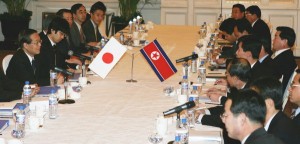
For example, one matter that deserves attention is the nature of the suddenly developing foreign maneuvers being undertaken lately by the biggest players around both Koreas.
Despite the mantras of a specific group within the Russian political class, the “democratic” Japan is showing increasingly more interest not towards the similarly “democratic” South Korea, but the “totalitarian” North Korea. This is happening despite all of Tokyo’s philippics towards North Korea’s nuclear program and despite the fact that within official Japanese documents related to defence and security, North Korea appears as one of the greatest foreign threats.
It is important to note that this trend within Japan’s foreign policy is met with understanding from Pyongyang. This is also despite the frequent North Korean propagandistic relentlessness towards the Japanese leadership. Another noteworthy aspect is that the very process of moving to “feel out” the other side has been received with a cautious attitude in Seoul. In a paradoxical twist, the reason for this move became the so-called “issue of the abducted”, which has, until now, been seen as almost the greatest hurdle in the development of Japanese-North Korean relations.
At the same time, the “authoritarian” Beijing is exhibiting growing interest in developing ties with the “democratic” South Korea and also with full backing from the Seoul side. This particularly manifested during Chinese President Xi Jinping’s visit to South Korea on July 3-5, 2014. This was the first time that Chinese leadership made an official visit to South Korea in the entire history of their bilateral relations.
It is no accident, then, that the visit to Seoul by the Chinese leader and his fruitful negotiations with the South Korean President Park Geun-hye was held one day after the Japanese government adopted the “reinterpretation” of the anti-war Article 9 of the Japanese constitution (a move that’s been on the table for some time). The decision allows for the Self-Defense Forces to participate in so-called “acts of collective self-defense”, a tremendously enormous expansion of the limitations placed on using the Japanese armed forces.
Together with the increasingly undefined official stance on various aspects of Japan’s participation in the Pacific war, this new development in the sphere of national defence is serving as an important incentive to spur closer relations between South Korea and China. Bilateral trade annually increases by an average of 7% and in 2013, it amounted to $270 billion, which is greater than the South Korea’s trade with the US and Japan combined. Both of these topics, that is, the “militarisation of Japan” and the necessity to further develop bilateral relations were the main focus of the discussion between the leaders of the two countries.
Half a year ago, the regional “well-wishers” had hoped that China’s relations with South Korea would be irreparably damaged after the Chinese Defence Ministry enacted the so-called Air Defence Identification Zone over a portion of the East China Sea. Even though its main goal was to control the air space over a group of islands whose ownership is currently being disputed between China and Japan, it also covered the underwater cliffs that belong to, as is believed in Seoul, South Korea. However, the “clarification of matters” undertaken energetically and quickly by Beijing lifted the suspicions borne by Seoul about the reasons behind implementing the ID Zone.
Meanwhile, the “information” about the political opponents of the current North Korean regime being fed to the dogs or executed by grenade launchers (flamethrowers) is suspected to have been spread by Chinese internet jokers. This is at a time when China is ideologically close to North Korea and is considered its economic and foreign policy pillar.
A necessary question arises of whether these “jokers” are acting outside of the current authorities, or are they being used by these authorities as one of the methods to “influence” the North Korean leadership?
Another noteworthy aspect is the speed with which global media (including the specific group of Russian media) spread these and other similar “jokes”. For example, jokes like the one about how “half of the population of Cambodia is annihilated by Pol Pot”.
Incidentally, throwing around symbolically tyrannical names (Pol Pot is joined by all the Kims, Stalin, Hitler and Ivan the Terrible) is a known tactic in “discussions” led by members of the abovementioned group of the Russian (and others) political class. Propaganda with the use of symbolic names is called on to form an image of “Asiatic life” which is contrasted to “progressive Europe”. These kinds of primitive tactics also managed to trick the Maidan simpletons.
All of the external absurdities seen in the movements surrounding both Koreas still manage to let through glimpses of the nature of the new global game. Its main difference from the previous game (which holds the name of the Cold War) is the sharp drop in the importance of ideological factors. It would be even better to say that the motivation for the Cold War departed from historical “tradition”, whereas today, we are witnessing its revival. Although, that Cold War also exhibited a certain presence of the same “tradition” behind the ideological side of the conflict.
The main source of concern becomes not the ideological, societal and social characteristics of the partner in the global game, but the very fact of the existence of a partnership and comprehensive growth. The world is not currently witnessing a fight between the “democracies” and “autocracies”, but between states with competing national interests.
It was always this way and, seemingly, was written down for the first time 2,500 years ago by Thucydides in his History of the Peloponnesian War. The clear return of the “traditional” motives to the global political game is the reason for making comparisons between times as of late and those leading up to the First World War.
Vladimir Terekhov, leading research fellow at the Russian Institute of Strategic Research’s Center for Asia and the Middle East, exclusively for the online magazine “New Eastern Outlook”.
